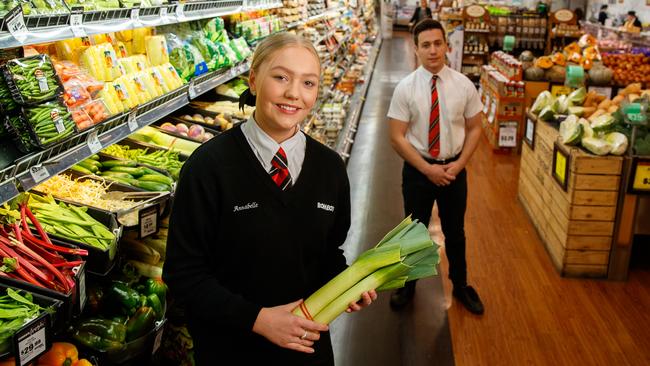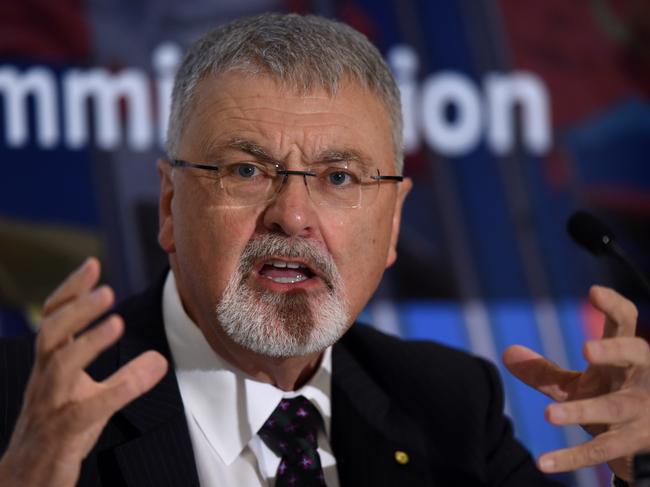SACE Board to create Learner Profile school-leaving certificate with skills alongside subject grades
Work at Maccas after school? Volunteer for the RSPCA? Captain the netball team? You may have skills a uni or employer wants to know about more than whether you passed ancient studies. Soon your Year 12 certificate will show what you’re really worth.
Students who gain experience outside school, such as part-time work or community service, will have those skills added to their school-leaving certificate under a major change to assessment.
The new certificate, called a Learner Profile, would include SACE results and be used toward entry into university or vocational studies and job applications.
The change will be at the centre of the SACE Board’s three-year strategic plan being published in August and come into effect as early as 2023.
South Australia was “well placed to take a lead role nationally in pioneering a new approach”, Education Minister John Gardner said.
The SACE Board, which runs the SA Certificate of Education, wanted to provide a broad view of a student’s capabilities, chief executive Martin Westwell said.
The SA Tertiary Admissions Centre is working closely with the SACE Board.
“SATAC supports the idea of a broad set of selection criteria for students who wish to transition to tertiary study,” chief executive Stuart Mossman said.
The Learner Profile would include subject results, literacy, numeracy, digital literacy and qualities such as leadership demonstrated in and outside school.
Abilities such as entrepreneurship and problem-solving would be given a rating under the new scheme.
Subject results and grades were important but only presented a partial picture, Prof Westwell said.

“You’re not saying this is one view, the academic grades, and then there’s a different view over here of these other capabilities,” he said.
“We want to bring all of that together.
“You can infer some things about a student from their grades but there are other things you can’t infer.
“Can they get things done? When the world throws some problems and furphies at them, can they navigate through that.”
The SACE Board would now work on the structure of the Learner Profile.
It would capture evidence of learning outside the school, such as working on a family farm.
“The first things will be entrepreneurial thinking and personal enterprise,” he said.
“Students may be working at Maccas on the weekend and demonstrate some of the capabilities we’re looking for.
“We want to value the student’s learning and development wherever it occurs.”
There would be “quality-assurance processes”, with teachers likely to make the primary assessment and the SACE Board moderating results, as already happens.
“We know we can trust teachers’ professional judgment,” he said.
“Teachers are great at getting under the surface.”
Australian Education Union SA president Lara Golding said students needed a broad range of skills and capabilities to succeed in life after school “and assessement of achievement should reflect that”.
Employers may also be involved in providing evidence of acquired skills.

Foodland deputy chairman Paul Romeo said his family’s stores taught young people valuable skills such as customer service, working with money and presentation.
“We teach them to make all of our customers feel welcome,” he said.
Annabelle Boyd-Turner, who is in Year 12 at St Dominic’s Priory, said the Learner Profile “makes a lot of sense”.
“I work 20 hours a week so I’ve learnt a lot about time management,” she said.
She’d also become a leader as a shift supervisor and learnt how to talk to customers.
Prof Westwell said the change would give students an incentive to study subjects such as languages where complementary learnings could be evaluated alongside grades, rather than picking subjects to boost their Australian Tertiary Admissions Rank (ATAR).
It was a complex change and pilot programs would help iron out issues, he said.
At least 17 schools in SA will work with Melbourne University researchers led by Professor Sandra Milligan to test-run assessing skills such as communication, critical reflection, intercultural and ethical understanding.
The SACE Board would engage with universities, TAFE and other vocational education providers and business organisations to ensure the Learner Profile met their needs.
The skills would be marked on a scale. This was unlikely to be a grade and more likely something like a traffic light plus a description.
Prof Westwell said the Learner Profile would be carefully structured to ensure students would not be disadvantaged if they were from lower socio-economic backgrounds or regional areas with less access to extra-curricular activities.
The SACE Board’s work was highlighted in a report to the Education Council by Peter Shergold, a former chief of the Department of Prime Minister and Cabinet.
Professor Shergold said existing school-leaving certificates were “necessary but not sufficient”.
The certificate fails to provide “a compelling and consistent way to depict the full range of an individual’s strengths, capabilities and achievements”.
“Consequently, it is not well utilised by tertiary institutions or employers,” he said.
Consultation found broad support from educators and employers that a Learner Profile would be “significantly more useful”.

The Shergold report also recommended creation of an Education Passport — a document which would be developed throughout their career and lifelong learning.
“Students should be encouraged to build on the Learner Profile that they receive on completing Year 12, to develop an Education Passport,” he said.
“The passport would progressively record both the formal and informal learning opportunities they engage with throughout their lives.
“Employers, equally, should be encouraged to access the passport when they are selecting applicants for positions.”
SA schools involved in research with Melbourne University to test how to assess capabilities include:
Public sector
Adelaide Botanic – critical thinking
Australian Science and Maths School – intercultural competence
Craigmore – self-regulation
Heathfield – communication
Marryatville – critical thinking
Wirreanda – critical reflection
Catholic Education SA
Christian Brothers and Rostrevor – critical and creative thinking
Gleeson, St Ignatius and St Paul’s – personal and social capability
St Mary’s – ethical understanding
Thomas More College – capable learner
Independent schools
Cornerstone College and Walford – critical and creative thinking
Scotch College – ethical understanding
Other capabilities to test
Leadership, teamwork and entrepreneurial skill
